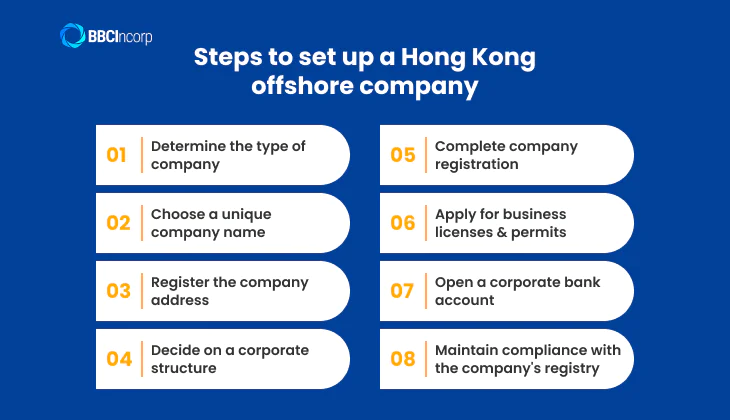
- Overview of an offshore company in Hong Kong
- Advantages and disadvantages of Hong Kong offshore company setup
- Hong Kong offshore company setup for foreigners
- Annual compliance requirements after setting up an offshore company in HK
- Bank account options for offshore companies in Hong Kong
- Hassle-free Hong Kong offshore company formation with BBCIncorp
- Conclusion
With its favorable business environment, strategic location, and competitive tax regime, Hong Kong is an increasingly popular destination for foreigners seeking to expand their businesses globally. However, the process of opening an offshore company in Hong Kong can seem daunting, with many legal and regulatory requirements to navigate.
If you are considering a Hong Kong offshore company setup, understanding the full process and local compliance rules is crucial to ensure a smooth start.
In this blog post, we’ll break down everything you need to know about setting up a HK offshore company, including the benefits, requirements, and steps involved, so you can make an informed decision and get your business up and running in no time. So, let’s get started!
Key takeaway:
- Hong Kong remains a premier offshore destination, known for its tax efficiency, transparent legal system, and global accessibility for entrepreneurs.
- Starting a Hong Kong offshore company offers benefits like tax exemption and full foreign ownership, with clear setup requirements including a local company secretary and registered address.
- Maintaining compliance is crucial, as companies must renew business registration, keep accurate records, and file annual and profit tax returns on time.
- Opening a business bank account can be challenging due to strict AML and KYC standards, but offshore banking alternatives provide flexibility for international operations.
- With BBCIncorp’s professional assistance, Hong Kong offshore company setup becomes seamless, compliant, and fully equipped for global expansion.
Overview of an offshore company in Hong Kong
What is a Hong Kong offshore company?
A Hong Kong offshore company is like a global passport for your business. It’s a company incorporated in Hong Kong that doesn’t do business within the territory, making it an excellent option for international trade, investment, and tax planning purposes.
What’s great about this offshore company is that they enjoy all the benefits associated with an onshore company but come with more advantages, such as exemption from taxes on foreign sourced income and profits not generated in Hong Kong, no minimum capital requirements, and no foreign exchange control.
Setting up an offshore company in Hong Kong with these typical benefits can be a fantastic option for businesses looking to expand globally and start starting a business in Asia.

Uses of a Hong Kong offshore company
Holding and international trading are two of the most common purposes for establishing an offshore company in Hong Kong.
Holding businesses involve holding shares in foreign companies and receiving dividends as the primary source of income. You can also hold other assets, such as patents and trademarks, and generate revenue by renting or selling them overseas.
One significant benefit of setting up an offshore holding business in Hong Kong is that any dividends or profits earned outside Hong Kong are tax-exempt. This can lead to significant savings and increased profitability for your business.
International trading involves registering an offshore company in Hong Kong to gain a good reputation, sourcing supplies from countries with competitive prices, and selling them to a third country.
The best part is that, due to their “offshore status,” all the profits you earn from these operations are tax-free, so your trading business can prosper on a global scale.
Comparison between offshore and onshore companies in Hong Kong
Offshore and onshore companies in Hong Kong differ in several aspects. Consider the following details for a better understanding:
Offshore company
- Tax exemption via offshore claim;
- No taxation on overseas profit, capital gains, and dividends;
- Not allowed to conduct trade with Hong Kong customers or do business within Hong Kong in general;
- File audited financial statements and hold annual general meetings in accordance with the law.
Onshore company
- No tax exemption available;
- Subject to corporate tax at 16.5% on overseas profit, capital gains, and dividends;
- Allowed to conduct trade with Hong Kong customers and do business within Hong Kong;
- Submit audited financial statements and conduct annual general meetings in accordance with Hong Kong law.
Overall, offshore companies provide more flexibility and cost savings due to their less stringent regulations and lower overhead, while onshore companies offer greater legitimacy in the eyes of Hong Kong authorities and access to the local market.
The decision between an offshore or onshore company boils down to what a business owner’s needs are and what goals they wish to achieve.
Advantages and disadvantages of Hong Kong offshore company setup
Hong Kong’s offshore company setup attracts global entrepreneurs for its tax benefits and business freedom. However, it also comes with certain requirements and challenges. Let’s explore the key advantages and disadvantages before you decide:

Advantages of Hong Kong offshore company setup
Tax exemptions
Hong Kong levies taxes on a territorial basis, meaning that income or profits generated outside of the territory are not subject to taxation.
Therefore, if your company does not have any operations or activities in Hong Kong and its earnings come solely from offshore sources, it may be eligible for a full or partial offshore tax exemption in Hong Kong.
To qualify for tax exemption, your company must file an Offshore Tax Claim (OTC) with the Inland Revenue Department (IRD) to achieve “offshore status”.
4 types of taxes that matter for individuals and businesses in Hong Kong

100% foreign ownership
Hong Kong’s laws do not impose any restrictions on the percentage of foreign ownership in offshore companies, granting foreigners ultimate possession with 100% of the shares in those companies. This offers an incomparable advantage that cannot be found anywhere else.
Reputation
Although numerous tax haven countries offer offshore tax benefits, their presence on global blacklists poses a great obstacle for businesses seeking to operate within the sector. Hong Kong is not considered a tax haven, but rather a low-tax jurisdiction.
Thus, by incorporating your HK offshore company, you will receive an unparalleled sense of credibility and reputation that proves invaluable when entering into international markets where trustworthiness is paramount.
Dive deeper into Hong Kong’s tax haven status to understand why international businesses consistently choose Hong Kong as a preferred jurisdiction for offshore structures.
Disadvantages of Hong Kong offshore company setup
Company secretary, registered address required
Starting an offshore company in Hong Kong comes with several considerations, such as the cost and complexity of finding a competent company secretary to ensure all paperwork is filed on time and records are up-to-date.
In addition, every Hong Kong offshore company must maintain a valid registered business address within the territory. This address serves as the official channel for all government correspondence, notices, and legal documents.
If your company relocates or changes its registered office, you are required to update this information through the BR change address procedure with the Companies Registry to stay compliant.
Local bank account difficulty
Opening a local bank account for a Hong Kong offshore company can be a challenging process. Local banks in Hong Kong are required to comply with strict Know Your Customer (KYC) and Anti-Money Laundering (AML) regulations and may be hesitant to accept offshore companies as clients due to perceived higher risks.
Additionally, banks may require a personal visit of the company’s directors or representatives for account opening and ongoing maintenance, which can be difficult for offshore companies whose directors or representatives are located overseas.
Disclosure of company members
The Hong Kong government requires all businesses to reveal the identity of shareholders and directors via its Companies Registrar. Fortunately, business owners can still maintain their anonymity by engaging in nominee director and shareholder services.
Hong Kong offshore company setup for foreigners
The process is fairly straightforward, yet there are some basic requirements and steps to follow. Check out the below section to understand how you can open an offshore company in Hong Kong.
Hong Kong offshore company setup requirements
Before moving forward with your Hong Kong offshore company setup, it’s essential to understand the basic incorporation requirements set by the Companies Registry. Meeting these conditions ensures that your company can operate smoothly and remain compliant with local regulations.
Below is a summary of the key requirements for establishing an offshore company in Hong Kong:
| Requirement | Description |
| Company name | Must be unique and not registered with the Hong Kong Companies Registry. Ensure it reflects your business identity and check availability before filing. |
| Registered office address | A Hong Kong-based address is mandatory for official correspondence. Any change must be reported through the BR change address process to remain compliant. |
| Company secretary | Must appoint a Hong Kong resident or licensed corporate secretary responsible for filings, statutory records, and legal compliance. |
| Directors and shareholders | At least one director and one shareholder are required; both roles can be held by the same person. No residency requirement applies. |
| Share capital | Minimum HK$1; however, HK$10,000 is recommended for better flexibility in business operations and investment. |
| Business license | Depending on your business activity, you may need specific licenses or permits from relevant Hong Kong authorities. |
Company name
Selecting a novel and unregistered name with the Hong Kong Companies Registry is crucial. Make certain that this title precisely portrays your business’s mission, while simultaneously differentiating itself from other firms in the field. As soon as you have settled on your chosen company name, you should register it to secure legal protection and exclusive rights of use for yourself.
Registered office address
Establishing a Hong Kong-based offshore company necessitates the registration of an office address with the Companies Registry to receive notifications and documents. Any subsequent modifications must be reported quickly to avoid any potential problems.
Company secretary
You must appoint a company secretary who is a resident of Hong Kong to fulfill the requirements for incorporation. They will be responsible for filing and registering documents, ensuring compliance with applicable laws and regulations, and other duties as prescribed by the Companies Registry.
Directors and shareholders
For any Hong Kong-registered company, appointing at least one director and shareholder is obligatory. It’s fine if you want the same person to take both roles; there is also no need for either of them to be a resident of Hong Kong.
Capital
The minimum authorized share capital requirement for setting up an offshore company in Hong Kong starts from HK$1. However, it’s highly recommended that business owners allocate a nominal figure such as HK$10,000 for their authorized share capital so they can have more flexibility when receiving investments or launching operations.
Business license
No matter the business activities you are engaged in, it is critical to obtain a valid business license or permit from the relevant Hong Kong authority. Certain sectors, such as financial services, food and beverage, or education, require specific licenses before commencing operations.
For detailed guidance, refer to explore the Business Licence Information Service provided by the SUCCESS (Support and Consultation Centre for Small and Medium Enterprises), which outlines the types of business licences required by industry sectors.
Steps to set up a Hong Kong offshore company
Setting up an offshore company in Hong Kong can be a great way to do business in the global marketplace and take advantage of certain tax benefits. Here are the typical 8 steps needed to set up an offshore company in Hong Kong:

Step 1: Determine the type of company
Determine the type of company that best suits your needs. Consider factors such as your business’s size, scope, nature, taxation obligations, and other legal requirements.
Step 2: Choose a unique company name
Pick a unique name for your company. Ensure that another business does not already take it by checking with the Companies Registry in Hong Kong.
Step 3: Register the company address
Register the address of your company with the Companies Registry. This is where official documents will be sent and where shareholders’ meetings should occur.
Step 4: Decide on a corporate structure
Decide on a corporate structure that best suits your business needs. Options include Limited Liability Company, Sole Proprietorship, Partnership, Branch Office, and Representative Office.
Step 5: Complete company registration
Complete the registration process with the Companies Registry. This includes the appointment of company officers and the submission of relevant documentation.
Step 6: Apply for business licenses and permits
Depending on your company’s business activities, you may be required to obtain specific Hong Kong business licenses or permits from the relevant authorities. These documents ensure that your operations comply with local industry regulations before commencing any commercial activities.
Step 7: Open a corporate bank account
Open a corporate bank account to facilitate transactions. You may also need to open an offshore bank account if you are expanding your business internationally.
Step 8: Maintain compliance with the company’s registry
File the necessary paperwork to keep your company in good standing with the Companies Registry, such as annual returns and other maintenance filings. This will help protect your business against potential legal risks.
To learn more about setting up a company in Hong Kong, explore our detailed guide that walks you through each step of the registration and compliance process, ensuring your business stays compliant from incorporation to ongoing operations.
Annual compliance requirements after setting up an offshore company in HK
It’s crucial to keep up with the Hong Kong annual compliance requirements for your offshore company to ensure long-term success. Make sure you comply with these regulations to avoid fines, penalties, or legal action.

Business registration renewal
Your Business Registration Certificate needs to be renewed either annually or triennially, depending on its type. Be sure you renew it no later than one and a half months before the expiry date of your certificate to stay compliant.
Company record maintenance
As an offshore company in Hong Kong, it’s important to keep records of your entity, such as records of former members and meetings of members, as well as written records of decisions of a single-member company. Proper business record keeping ensures transparency and compliance with statutory requirements
These records must be kept at your company’s registered office in Hong Kong and must be maintained for at least 10 years from the date of the meeting, resolution, or decision.
Accounting record keeping
To remain compliant and ensure efficient auditing, your firm’s accounting documents must be kept at the registered office for a minimum of seven years after each fiscal year. By doing this, your organization will continue to operate in good standing with all necessary regulations.
Annual Return
Every business established in Hong Kong must submit an Annual Return – Form NAR1 to the Companies Registry within 42 days following the anniversary of its formation. This return provides updated information about the company, including details of directors, shareholders, company secretary, and registered office address
The document must be signed off by a director, company secretary, manager, or any other duly authorized representative. Late submission may result in penalties or prosecution.
Profit Tax Return
Generally, all companies that are formed/registered under the Companies Ordinance Cap 622, except for exceptions, need to file their profit tax return along with any necessary supplementary forms with the Inland Revenue Department (IRD) for chargeable profit.
The tax return Hong Kong must be filed within 1 month of the issue date, and payment of the tax must be made within 1 month of the tax return filing deadline.
Bank account options for offshore companies in Hong Kong
Offshore companies in Hong Kong can choose to open a bank account with a local bank or offshore bank.
Open business bank account with local banks
As one of the world’s most vital banking hubs, Hong Kong offers a broad array of services to corporations that establish operations in the city. However, Anti-money Laundering and due diligence regulations are overwhelmingly stringent here, making it difficult for offshore entities to open bank accounts with local banks.
The bank may request an interview with one or more of the company’s directors and shareholders. Get ready to provide answers about your business, where your funds come from, and what kind of transaction volumes you anticipate.
To ensure a successful bank account opening, consider engaging the services of an experienced corporate service provider or accounting firm. They can offer guidance and advice on required paperwork while assisting you with due diligence requirements. Plus, they’ll act as your liaison to the bank so that all communication is managed professionally and efficiently.
Open a business bank account with offshore banks
You don’t need to set up a local bank account for your Hong Kong offshore company; an offshore banking account is just as good and it can even provide you with good banking services just like a local one.
With hundreds of offshore banks operating worldwide, each offers different levels of service, fees, and support. Before choosing one, it’s important to understand how to open an offshore account properly, from verifying bank requirements to preparing KYC documents and demonstrating the legitimacy of your business activities.
Careful research will help you make an informed decision and ensure smooth banking operations for your Hong Kong offshore company.
Hassle-free Hong Kong offshore company formation with BBCIncorp
BBCIncorp provides comprehensive and technology-driven offshore company formation services in Hong Kong, tailored to meet the needs of international entrepreneurs and businesses seeking an efficient gateway into Asia.
By combining expert consultancy with secure digital processes, we simplify incorporation and compliance management so you can focus on strategy, growth, and value creation.
Hong Kong remains one of the most reputable and business-friendly jurisdictions for offshore structures.
Yet, navigating incorporation requirements, documentation, and due diligence can still be complex, especially for foreign owners. BBCIncorp bridges that gap by providing expert guidance, local insights, and a transparent process designed to help you establish your Hong Kong offshore company without unnecessary friction.
We provide end-to-end support that covers every step of your offshore formation journey, including:
- Company Formation: Strategic consultation to help you choose the most suitable company structure and streamline the registration process with the Companies Registry.
- Company Secretary Services: Assistance with statutory filings, governance requirements, and ongoing compliance to maintain good standing with authorities.
- Registered Office Address: Provision of a valid Hong Kong address that meets legal requirements and enhances your corporate credibility.
- Bank Account Assistance: Step-by-step guidance on preparing documentation, meeting KYC standards, and connecting with reliable banking partners.
- Compliance and Taxation Support: Ensure full adherence to Hong Kong’s annual reporting and profit tax obligations through professional compliance management.
- Accounting and Bookkeeping: Maintain accurate and audit-ready records to support long-term operational transparency.
At BBCIncorp, we go beyond incorporation, we deliver confidence. Our seamless digital onboarding system, multilingual specialists, and responsive client support make the process straightforward and stress-free for businesses of all sizes.
Whether you are setting up your first offshore entity or restructuring an existing one, BBCIncorp ensures that your company is built on a strong, compliant foundation ready to operate, expand, and succeed globally.
Conclusion
Opening an offshore company in Hong Kong can offer numerous benefits for foreign entrepreneurs looking to expand their business globally, from favorable tax and regulatory regimes to access to international markets.
However, seeking professional advice and following all regulations and requirements is important to ensure a smooth and compliant Hong Kong offshore company setup process.
Our team at BBCIncorp can provide the guidance and assistance you need for successful Hong Kong company formation. Do reach out to us via service@bbcincorp.com or use our chatbox for more advice on your business.
Frequently Asked Questions
Who is eligible to set up an offshore company in Hong Kong?
Any individual or corporate entity, regardless of nationality, can establish an offshore company in Hong Kong. There are no residency or nationality restrictions for shareholders or directors.
However, every company must appoint at least one local company secretary and maintain a registered address in Hong Kong to comply with the Companies Ordinance (Cap. 622).
Are there restrictions on U.S. entrepreneurs owning 100% of the company?
No. Hong Kong imposes no restrictions on foreign ownership, allowing U.S. entrepreneurs and corporations to own 100% of a Hong Kong-registered company.
There are no restrictions on foreign equity participation, and overseas investors enjoy the same rights and legal protection as local businesses.
Disclaimer: While BBCIncorp strives to make the information on this website as timely and accurate as possible, the information itself is for reference purposes only. You should not substitute the information provided in this article for competent legal advice. Feel free to contact BBCIncorp’s customer services for advice on your specific cases.
- Overview of an offshore company in Hong Kong
- Advantages and disadvantages of Hong Kong offshore company setup
- Hong Kong offshore company setup for foreigners
- Annual compliance requirements after setting up an offshore company in HK
- Bank account options for offshore companies in Hong Kong
- Hassle-free Hong Kong offshore company formation with BBCIncorp
- Conclusion
Industry News & Insights
Get helpful tips and info from our newsletter!
Stay in the know and be empowered with our strategic how-tos, resources, and guidelines.






